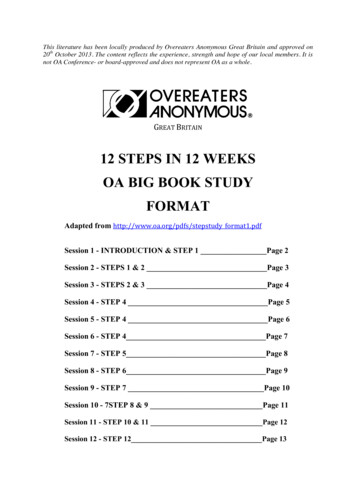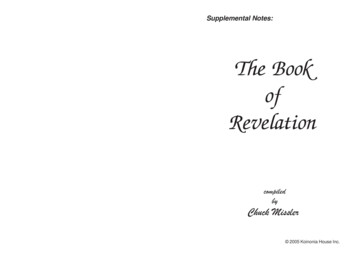
Transcription
6-SESSIONBIBLE STUDYNEHEMIAH
EXPLORE THE BIBLE: Nehemiah 2014 LifeWay Press ISBN 978-1-4300-3675-3Let the Word dwell in you.Item 005695957Dewey decimal classification: 222.8Subject heading: NEHEMIAH\JERUSALEM—WALL\LEADERSHIPERIC GEIGERVice President, Church ResourcesTONY EVANSGeneral EditorTOBY JENNINGSManaging EditorWith Explore the Bible, groups can expect to engageScripture in its proper context and be better preparedto live it out in their own context. These book-by-bookstudies will help participants—››grow in their love for Scripture;››gain new knowledge about what the Bible teaches;››develop biblical disciplines;››internalize the Word in a way that transforms their /web/ExploreTheBibleJEREMY MAXFIELDContent EditorFAITH WHATLEYDirector, Adult MinistryPHILIP NATIONDirector, Adult Ministry PublishingSend questions/comments to: Content Editor, Explorethe Bible: Adult Small-Group Study; One LifeWay Plaza;Nashville, TN 37234-0152.Printed in the United States of AmericaFor ordering or inquiries visit www.lifeway.com;write to LifeWay Small Groups; One LifeWay Plaza;Nashville, TN 37234-0152; or call toll free 800.458.2772.We believe that the Bible has God for its author;salvation for its end; and truth, without any mixtureof error, for its matter and that all Scripture is totallytrue and trustworthy. To review LifeWay’s rinalguideline.Unless otherwise noted, all Scripture quotations aretaken from the Holman Christian Standard Bible ,Copyright 1999, 2000, 2002, 2003, 2009 by HolmanBible Publishers . Used by permission. Holman ChristianStandard Bible , Holman CSB , and HCSB are federallyregistered trademarks of Holman Bible Publishers.Page 7 quotation: Tony Evans, Kingdom Man (CarolStream, IL: Tyndale, 2012), 19. Page 17 quotation: TonyEvans, Facebook, 1 December 2013 [cited 25 June2014]. Page 27 quotation: Corrie Ten Boom, Clippingsfrom My Notebook (Nashville: Thomas Nelson, 1982),27. Page 37 quotation: Tony Evans, Kingdom Man, 43.Page 47 quotation: Ronald Reagan, “Remarks at theAnnual National Prayer Breakfast,” 3 February 1983[cited 25 June 2014]. Available from the Internet: a.htm.Page 57 quotation: Dietrich Bonhoeffer, BrainyQuote,cited 25 June 2014. Available from the Internet: www.brainyquote.com. 1
ABOUT THIS STUDYSOMETHING HAS TO BE DONE. SOMEONE HAS TO TAKE ACTION. WILL IT BE YOU?God can make a difference through you. No problem is too big. No burden is too heavy. Nothing is toobroken. Nobody is too lost. Nowhere is too far away. God is Lord of it all.Change is possible. It’s not easy, but it’s possible.The Book of Nehemiah gives great encouragement to anyone who sees what’s wrong in the world andlongs to fix it. It’s a story of persevering and making the most of every opportunity. God uses peoplewho are willing to take action for His sake.Explore the Bible: Nehemiah helps you know and apply the encouraging and empowering truthof God’s Word. Each session is organized in the following way.UNDERSTAND THE CONTEXT: This page explains the original context of each passage and beginsrelating the primary themes to your life today.EXPLORE THE TEXT: These pages walk you through Scripture, providing helpful commentary andencouraging thoughtful interaction with God through His Word.OBEY THE TEXT: This page helps you apply the truths you’ve explored. It’s not enough to know whatthe Bible says. God’s Word has the power to change your life.LEADER GUIDE: This final section provides optional discussion starters and suggested questionsto help anyone lead a group in reviewing each section of the personal study.2E X PL OR E T H E B I BL E
GROUP COMMITMENTAs you begin this study, it’s important that everyone agrees to key group values. Clearly establishingthe purpose of your time together will foster healthy expectations and help ease any uncertainties.The goal is to ensure that everyone has a positive experience leading to spiritual growth and truecommunity. Initial each value as you discuss the following with your group. PRIORITYLife is busy, but we value this time with one another and with God’s Word. We choose to makebeing together a priority. PARTICIPATIONWe’re a group. Everyone is encouraged to participate. No one dominates. RESPECTEveryone is given the right to his or her own opinions. All questions are encouraged and respected. TRUSTEach person humbly seeks truth through time in prayer and in the Bible. We trust God as theloving authority in our lives. CONFIDENTIALITYAnything said in our meetings is never repeated outside the group without the permissionof everyone involved. This commitment is vital in creating an environment of trustand openness. SUPPORTEveryone can count on anyone in this group. Permission is given to call on one another at anytime, especially in times of crisis. The group provides care for every member. ACCOUNTABILITYWe agree to let the members of our group hold us accountable to commitments we make in theloving ways we decide on. Questions are always welcome. Unsolicited advice, however,isn’t permitted.I agree to all the commitments.Date 3
GENERAL EDITORDr. Tony Evans is one of America’s most respected leaders inevangelical circles. He is a pastor, a best-selling author, and afrequent speaker at Bible conferences and seminars throughoutthe nation.Dr. Evans has served as the senior pastor of Oak Cliff BibleFellowship in Dallas, Texas, for more than 35 years. He is alsothe founder and president of The Urban Alternative, a ministry that seeks to restorehope and transform lives through the proclamation and application of God’s Word.Dr. Evans is the author of more than 50 books, including the following LifeWayshort-term Bible studies: Victory in Spiritual Warfare, Kingdom Man, Kingdom Agenda,It’s Not Too Late, and The Power of God’s Names. For information about these Biblestudies, please visit www.lifeway.com/tonyevans.4E X PL OR E T H E B I BL E
CONTENTSSession 1God Inspires the Work (Nehemiah 2:1-8,17-18) . . . . . . . .6Session 2Establish Justice in God’s Community (Nehemiah 5:1-13)16Session 3Be Faithful in Adversity (Nehemiah 6:1-19) . . . . . . . . . . .26Session 4Do Your Appointed Part (Nehemiah 7:1-7) . . . . . . . . . . . . .36Session 5Get an Understanding (Nehemiah 8:1-12) . . . . . . . . . . . . .46Session 6Commit Your Way to the Lord (Nehemiah 10:28-39). . . .56Leader Guide . . . . . . . . . . . . . . . . . . . . . . . . . . . . . . . . . . . . . . . . . . . . . . . . . . . .66 5
SESSION 1God Inspiresthe WorkGod restores His repentant people to do work that honors Him.6E X PL OR E T H E B I BL E
ABOUT THE BOOK OF NEHEMIAHIn the fifth century B.C., during the height of the Persian Empire, a descendant of a sworn enemy ofGod’s people rose to a position of great power in the empire. He used this position to plan and receiveauthorization for a genocide against the Jews, many of whom were living in exile in the heartland ofthe empire. (See the Book of Esther.)The Sovereign God, however, had different plans for His exiled people. Through prophets such asJeremiah and Ezekiel, the Lord God had declared that He would one day restore the covenant peopleto the promised land (see Jer. 33:7-9; Ezek. 36:24-28). This restoration would have political aspects, tobe sure. But more important, God’s people would be restored spiritually. The Lord would forgive theirwaywardness, draw them to Himself, and give them a new heart and spirit. They would be restored intheir faith and in obedience to God’s Word.The Old Testament Books of Esther, Ezra, and Nehemiah chronicle events surrounding the Lord’srestoration of Jewish exiles to the promised land. The books bear the names of three Jewish heroesof the faith—ordinary believers who accomplished extraordinary things as a result of God’s mighty,providential hand and their bold, obedient faith.AUTHORThe Books of Ezra and Nehemiah contain sections that can be called memoirs, and those sectionswere most likely written by the two men. Yet most Bible scholars believe the books were broughtinto their final form by a single individual. Jewish tradition identifies that chronicler as Ezra, who isknown from the text to have been a skilled scribe (see Neh. 8:1,9).DATEIf the final compilation of Ezra-Nehemiah happened as described in the previous paragraph, then thedate of writing logically followed soon after the close of Nehemiah’s ministry in Jerusalem. Nehemiahwent to Jerusalem to rebuild the wall in the 20th year of King Artaxerxes (444 B.C.; see 2:1). Accordingto 13:6, Nehemiah returned to Babylon in the king’s 32nd year, or around 432 B.C. Sometime later,Nehemiah requested and received a second leave of absence. He traveled to Jerusalem again, where hespent an undetermined amount of time leading the people in religious and social reforms (13:7-31).Thus, Bible scholars suggest that Ezra-Nehemiah was finalized around 430 B.C.PURPOSEEzra-Nehemiah continues the history of God’s people as told in 1–2 Chronicles. The restoration ofJewish exiles to the promised land highlights the Lord’s faithfulness in keeping His promises. It alsoemphasizes the spiritual transformation needed by all people. Their stories can inspire us today asfollowers of Christ. Just as God showed His providential presence with and care for the Jewish exilesin the fifth century B.C., He continues to show His care for His people today. He continues to callbelievers to live boldly in faith, and He continues to provide servant leadership for His people.S ession 1 : G o d In s p ire s t h e Wo rk7
NEHEMIAH 2:1-8,17-181 During the month of Nisan in the twentieth year ofKing Artaxerxes, when wine was set before him, I tookthe wine and gave it to the king. I had never been sad inhis presence, 2 so the king said to me, “Why are you sad,when you aren’t sick? This is nothing but depression.” I wasoverwhelmed with fear 3 and replied to the king, “May theking live forever! Why should I not be sad when the citywhere my ancestors are buried lies in ruins and its gateshave been destroyed by fire?” 4 Then the king asked me,“What is your request?” So I prayed to the God of heaven5 and answered the king, “If it pleases the king, and if yourservant has found favor with you, send me to Judah andto the city where my ancestors are buried, so that I mayrebuild it.” 6 The king, with the queen seated beside him,asked me, “How long will your journey take, and when willyou return?” So I gave him a definite time, and it pleasedthe king to send me. 7 I also said to the king: “If it pleasesthe king, let me have letters written to the governors ofthe region west of the Euphrates River, so that they willgrant me safe passage until I reach Judah. 8 And let mehave a letter written to Asaph, keeper of the king’s forest,so that he will give me timber to rebuild the gates of thetemple’s fortress, the city wall, and the home where I willlive.” The king granted my requests, for I was graciouslystrengthened by my God.17 So I said to them, “You see the trouble we are in.Jerusalem lies in ruins and its gates have been burneddown. Come, let’s rebuild Jerusalem’s wall, so that we willno longer be a disgrace.” 18 I told them how the gracioushand of my God had been on me, and what the king hadsaid to me. They said, “Let’s start rebuilding,” and theywere encouraged to do this good work.8E X PL OR E T H E B I BL EThink About ItCircle the differentemotions Nehemiahexhibited andunderline the issuesprompting them.What do theseemotions suggest toyou about Nehemiah?
UNDERSTAND THE CONTEXTI’M NOT THE HERO TYPE. HOW CAN I POSSIBLY MAKE ADIFFERENCE? SURELY SOMEONE ELSE COULD DO BETTER! HAVEYOU EVER HAD THOUGHTS LIKE THIS?If so, you’re not alone. Most of us have or will have them along theway. Very few people go through this life without at some pointfeeling unprepared—if not powerless—to make a difference. Thereal question is what we can do to move past those feelings.The Book of Nehemiah picks up where the Book of Ezra ended.Jerusalem’s wall had been toppled and torn apart in 586 B.C. asthe people were taken into exile (see 2 Kings 25:10-11). Some50 years later, a first group of exiles returned to Jerusalemand began to rebuild. Then Ezra led another group of exilesto Jerusalem in 458 B.C. Fourteen years later, however, animportant task of restoration remained undone. The wall aroundJerusalem lay in ruins.Nehemiah lived in Susa in 445 B.C. He was still in exile, and heserved as the cupbearer to King Artaxerxes. (This was the sameking who had earlier commissioned Ezra’s return to Jerusalem.)The royal cupbearer was one of the king’s most trusted officials;he put his life on the line for the king every day. The cupbearerhad a dual role: first, to taste whatever the king desired to drink,ensuring it was poison free; second, to provide security for theking’s living quarters. Nehemiah’s job wasn’t menial; it was a roleof influence and honor.One day Nehemiah received a visit from a delegation of men fromJudah (see Neh. 1:2). The men told him of the shameful stateof affairs that continued to depress Jerusalem. Nehemiah washeartbroken. He fasted and prayed. He repented and pleaded withGod to complete the restoration of His people (see 1:4-10). In themidst of his prayer, Nehemiah seemed to realize that he wouldhave a part in what God was about to do. He also knew if Godcalled him to serve, then God would have to make it possible forhim to leave Susa. So Nehemiah prayed for grace and success whileserving the king (see 1:11).“ WHEN GOD SEARCHESFOR A MAN TOADVANCE HIS KINGDOM,DOES HE CALL YOURNAME?”—Dr. Tony EvansS ession 1 : G o d In s p ire s t h e Wo rk9
EXPLORE THE TEXTDISTRESS EXPOSED (Read Nehemiah 2:1-3.)Four months elapsed from the time Nehemiah received the news about Jerusalem until he had anopportunity to speak to the king. What did Nehemiah do during those four months? Nehemiah 1:4suggests that he continued to pray and to look for an opportunity to help. We can also assume that hethought about ideas for getting the wall rebuilt—what materials would be needed, how to acquire them,and where to rally the workforce. He wanted be ready when God showed him the right moment to act.That moment came during the month of Nisan (the first month on the Jewish calendar). Nehemiahwas carrying out his normal duties as cupbearer. Wine had been delivered, so Nehemiah tested itbefore giving some to the king. He always performed this duty with a good attitude, because it wasstandard practice to enter the king’s presence with a pleasant demeanor.This time, however, the king recognized that his normally happy cupbearer was heartsick aboutsomething. A sudden wave of panic washed over Nehemiah. He had violated the cupbearer’s code ofconduct. It was an uncharacteristic lapse in his work ethic. But it was also an opportunity to trust Godand to explain his situation to the king.How can times of sadness or fear also become opportunities to grow in your faith?10E X PL OR E T H E B I BL E
Nehemiah opened his heart to the king. He first addressed the kingwith respect and then expressed his deep concern in the form of aquestion. The question gave the king latitude either to abruptly endthe conversation or to graciously seek to help his heartsick servant.Nehemiah referred to Jerusalem as the place where his ancestors wereburied. Most ancient people groups treasured their ancestral burialgrounds. A family’s living members were responsible for preservingand maintaining the burial site. The king of Persia knew this, andhe sympathized with Nehemiah’s concern over the broken-downcondition of his ancestral city.Nehemiah carefully chose his words, framing his concern in nonpoliticaland nonreligious terms. In doing so, he calmed any potentialsuspicions. Instead of immediately telling the king what he wanted todo, Nehemiah sparked the king’s compassion and understanding.KEY DOCTRINEStewardshipBelievers are obligatedto serve God withour time, talents, andmaterial possessions.God entrusts us withthese resources to usefor His glory and for thebenefit of others.What role should tactfulness play in a Christ follower’sinteractions with those who may not know Christ?REQUEST PRESENTED(Read Nehemiah 2:4-5.)The king responded by asking Nehemiah to specify his request. Butbefore Nehemiah spoke another word to the king, he prayed. Thecontent of the prayer wasn’t recorded, yet this prayer confirmedNehemiah’s deep faith. He had spent the past four months praying forGod to act in a big way to help Jerusalem. Now God had put Nehemiahin a situation to have a conversation with the world’s wealthiest, mostpowerful human ruler. And that ruler had just asked Nehemiah, ineffect: “What do you want to do, and how can I help?”What can we learn from Nehemiah about prayerful humility?S ession 1 : G o d In s p ire s t h e Wo rk11
Nehemiah maintained a respectful, diplomatic tone to the king’s authority. He knew his plan of actiondepended on the king’s willingness to grant a leave of absence. Nehemiah further appealed to theking’s favor. He asked the king to send him to Judah to rebuild the city of his ancestors—that is,Jerusalem. It was a huge, bold vision that in time would play a role in an even greater, God-sized plan.Jerusalem would one day be the place where salvation for sinners was accomplished through thesubstitutionary death and resurrection of Jesus Christ (see Matt. 20:17-19).PREPARATIONS MADE (Read Nehemiah 2:6-8.)The abrupt appearance in this verse of the queen sitting beside the king may indicate that thisconversation was a separate, more private occasion than the one described in 2:1-5. In any case,the king wanted to learn a few additional details about Nehemiah’s plan. In particular, he wantedto know how long Nehemiah would be away and when he could expect Nehemiah to return to Susa.Nehemiah specified a time of return, a fact that underscores the careful planning he had done overthe previous months. We aren’t told the time of return in this verse, but we learn from 5:14 and 13:6that Nehemiah spent 12 years in Jerusalem before returning to Susa.Constantly thinking ahead, Nehemiah sought to obtain written documents of authority that he knewhe would need to travel safely through the outlying provinces and to complete his work in Jerusalem.History had already shown that non-Israelite groups around Judah would try to sabotage any attemptsthe Jews made to rebuild their covenant heritage (see Ezra 4:11-23). Nehemiah anticipated that hetoo would encounter resistance from the enemies of God’s people.Wall surrounding the old city of Jerusalem12E X PL OR E T H E B I BL E
Then Nehemiah requested a specific letter of authority to the officialwho had responsibility for the king’s forest (likely the great cedarforests located in Lebanon, where prized timber was cut and sold allover the ancient world). The Jews under Zerubbabel had acquiredtimber from there to use in the rebuilding of the temple (see Ezra 3:7).Nehemiah wanted the timber for constructing the gates, stabilizingthe wall, and building his residence.The king granted all these requests. Yet Nehemiah, like Ezra, knewthat neither he nor the king of Persia was the decisive player inthe restoration of God’s people. God was providentially at work,strengthening and using His willing servant Nehemiah.How does Nehemiah’s request for written documentsfrom the king demonstrate a balance of taking personalresponsibility and trusting God’s sovereignty?REBUILDING BEGUN (Nehemiah 2:17-18)BIBLE SKILLIdentify wayscontemporaries usea word or phrase.Ezra and Nehemiah bothreferred to the hand ofGod (see Ezra 7:9; 8:18;Neh. 2:18). Use a Bibleconcordance to locateother uses of the phrase“the hand of God” andcompare them to theways Ezra and Nehemiahused the term.What factors mightinfluence the way aperson views the handof God?After arriving in Jerusalem and privately examining the conditionsaround the city (see 2:11-16), Nehemiah spoke to the citizens andchallenged the people to rebuild. He identified with them and withthe distress the city was experiencing. They needed the wall’s physicalprotection for security. But it was the spiritual reality that distressedNehemiah the most. The holy city was a disgrace. The crumbled wallwas a reproach to the name of God, a matter of scorn and ridicule byJerusalem’s pagan neighbors. The honor of God’s name was at stake.In his effort to rally the people, Nehemiah reminded them of God’sprovidence, protection, and sufficiency. God’s hand, symbolic of Hisguidance and action, was evident. The king’s words of permission andauthority came next. This was acknowledged in the right order. Thepeople were encouraged and committed themselves to the task ahead.Nehemiah’s leadership, the people’s partnership, and God’s authorityinspired them to work.S ession 1 : G o d In s p ire s t h e Wo rk13
OBEY THE TEXTBelievers can pray and ask God for guidance when they’re distressed over conditions in theircommunities. Christ wants His followers to be involved in His kingdom work. He helps them prepareand gives them opportunities to serve in His plan of redemption.In what specific ways does our culture today directly or indirectly dishonor God?What are you doing to prepare yourself to be used by God? What role does prayer havein that preparation? What can your group do to encourage one another to serve Christ?What opportunities is God placing in front of you? What plan do you see Him workingout in your life? What are you doing in response to His direction?MEMORIZE“ The king asked me, ‘What is your request?’So I prayed to the God of heaven” (Neh. 2:4).14E X PL OR E T H E B I BL E
Use the space provided to make observations and record prayer requestsduring the group experience for this session.MY THOUGHTSRecord insights and questions from the group experience.MY RESPONSENote specific ways you will put into practice the truth explored this week.MY PRAYERSList specific prayer needs and answers to remember this week.S ession 1 : G o d In s p ire s t h e Wo rk15
Thus, Bible scholars suggest that Ezra-Nehemiah was finalized around 430 B.C. PURPOSE Ezra-Nehemiah continues the history of God’s people as told in 1–2 Chronicles. The restoration of Jewish exiles to the promised land highlig










